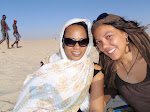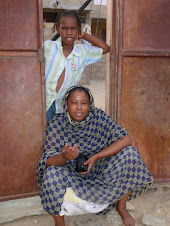Tuesday, July 29, 2008
Lesson 1
The National Syllabus booklet dropped on the desk in front of me, sending up puffs of dust from my desk into the air. I thumb through the photocopied paper bound with a plastic spiral. Inside those pages are the building blocks to my future success as an English Teacher in Mauritania. I stretch my neck around and take in the classroom. Basic. There is a chalkboard, broken and chipped on the wall with lesson plans of the past scrawled in French and Arabic. There are rows of desks in bench style crammed against each other, time and weather worn. The walls, ceiling and floor are all cement, the windows are sparse and the paint is thin. In these schools the learning environment must come directly from the person standing in front of the room. Most things, actually, must come from directly from the teacher. In the majority of the schools there are no books, rather, you create the book as you teach. Each word written on that blackboard will be published on the spot, written as law inside the notebooks of students. The education system in Mauritania is anything but desirable. A rough history of reforms and disagreements split minds on what and how things should be taught. These discussions push classroom supplies, management and upkeep into the background. Surprising? Not at all. Frustrating? Infinitely.
To start, it’s important to note is that Mauritania is divided in many ways, like so many of its African sisters. Colonized by France, Mauritania became independent in 1961. This was long enough for traditions of French school systems, government and politics to saturate the culture. Before the 1999 reform schools were taught patchwork quilt style. Each region and school adapted to a different style of education and language depended on geographical location. After 1999 schools developed a language-specific education style. Science type classes (math, biology and chemistry) are taught in French while Humanities type (theology, history, religion) classes are taught in Arabic. English education is a requirement and begins halfway through College (equivalent to American middle school) and continues through Lycee (equivalent to American high-school). I spent a good amount of time and wasted a good amount of paper figuring out and internalizing the system.
In comparison to the American school system there is one thing that stands out in my mind. Teaching to tests is very prevalent. And it’s getting worse. The requirements to graduate Lycee (taking the Brevet) are getting more rigorous and graduating College (taking the Bach) is next to impossible. There are many brick walls for Mauritanian youth as they make their way through an already perplexing system. A student is extremely lucky to make it to University (American College) and if they do get there, they better have the resources to travel out of country to get to a good facility. One can only begin to imagine the mental damage such a frustrating system can cause on the psyche.
On top of all this, the shinning façade of the Millennium Development Goals comes into play. MDGs, in short, are 8 sector specific guidelines to achieve preconceived goals determined by the United Nations meant to directly improve a developing country’s status and economy by 2015. Though, something along the way of achieving these goals is beginning to sour – a case of good intentions gone wrong. Take Mauritania’s approach to the education MDG into consideration. The goal is to achieve universal primary education – an objective that is great, solid and measurable. The Ministry of Education in Mauritania is starting to achieved this goal but at a grave cost. The push to get more kids in school has worked, but now, there aren’t enough crumbly schools for all those kids and many are being taught by poorly educated/trained teachers. Too many kids and not enough teachers is the name of the game. This is why when I finally land my spot in the classroom, 90+ sets of eyes will be staring back at me. I’ll have the usual mix of jaded burnt out pre-teens, over-achievers and some that just don’t care. Yet these students will be jammed into a hot classroom, fighting for desk space and wondering why the hell I’m teaching in their village. Sounds fun right? But alas, I’m up for the challenge.
For many students, the burning question bubbles from the sulfurous surface “what can an education do for me anyway”. I respond – if nothing else, an education gives you self worth. No matter what you’re learning or who you are, when you learn you discover; you discover more about yourself and others. When it comes down to it, I’m teaching English to these kids so they can pass the test and head toward higher learning, not so they can have conversations with other people in the street. Most will not continue, many will fail and the few lucky ones will struggle. I’m going to try my hardest to teach them to my greatest ability, and try to develop side projects to get the creative juices flowing. I’m going to run into walls with my kids, and I’m going to get lost in the maze – but it’s good to know education is a universal struggle, that I have solidarity over seas. Plus, as a bonus, I just picked up a box of colored chalk at the market and it comes with the color green.
To start, it’s important to note is that Mauritania is divided in many ways, like so many of its African sisters. Colonized by France, Mauritania became independent in 1961. This was long enough for traditions of French school systems, government and politics to saturate the culture. Before the 1999 reform schools were taught patchwork quilt style. Each region and school adapted to a different style of education and language depended on geographical location. After 1999 schools developed a language-specific education style. Science type classes (math, biology and chemistry) are taught in French while Humanities type (theology, history, religion) classes are taught in Arabic. English education is a requirement and begins halfway through College (equivalent to American middle school) and continues through Lycee (equivalent to American high-school). I spent a good amount of time and wasted a good amount of paper figuring out and internalizing the system.
In comparison to the American school system there is one thing that stands out in my mind. Teaching to tests is very prevalent. And it’s getting worse. The requirements to graduate Lycee (taking the Brevet) are getting more rigorous and graduating College (taking the Bach) is next to impossible. There are many brick walls for Mauritanian youth as they make their way through an already perplexing system. A student is extremely lucky to make it to University (American College) and if they do get there, they better have the resources to travel out of country to get to a good facility. One can only begin to imagine the mental damage such a frustrating system can cause on the psyche.
On top of all this, the shinning façade of the Millennium Development Goals comes into play. MDGs, in short, are 8 sector specific guidelines to achieve preconceived goals determined by the United Nations meant to directly improve a developing country’s status and economy by 2015. Though, something along the way of achieving these goals is beginning to sour – a case of good intentions gone wrong. Take Mauritania’s approach to the education MDG into consideration. The goal is to achieve universal primary education – an objective that is great, solid and measurable. The Ministry of Education in Mauritania is starting to achieved this goal but at a grave cost. The push to get more kids in school has worked, but now, there aren’t enough crumbly schools for all those kids and many are being taught by poorly educated/trained teachers. Too many kids and not enough teachers is the name of the game. This is why when I finally land my spot in the classroom, 90+ sets of eyes will be staring back at me. I’ll have the usual mix of jaded burnt out pre-teens, over-achievers and some that just don’t care. Yet these students will be jammed into a hot classroom, fighting for desk space and wondering why the hell I’m teaching in their village. Sounds fun right? But alas, I’m up for the challenge.
For many students, the burning question bubbles from the sulfurous surface “what can an education do for me anyway”. I respond – if nothing else, an education gives you self worth. No matter what you’re learning or who you are, when you learn you discover; you discover more about yourself and others. When it comes down to it, I’m teaching English to these kids so they can pass the test and head toward higher learning, not so they can have conversations with other people in the street. Most will not continue, many will fail and the few lucky ones will struggle. I’m going to try my hardest to teach them to my greatest ability, and try to develop side projects to get the creative juices flowing. I’m going to run into walls with my kids, and I’m going to get lost in the maze – but it’s good to know education is a universal struggle, that I have solidarity over seas. Plus, as a bonus, I just picked up a box of colored chalk at the market and it comes with the color green.
Subscribe to:
Post Comments (Atom)





4 comments:
Ashley,
Walls. Cement walls, brick walls, any wall. You have always been known for your climbing skills! I'm sure you will be leading the way for these kids to climb over walls or other barriers to achieve success.
Love, Deena
Ash,
The walls that must come down regarding the kids, reminded me of Obama's Berlin speech.
Here is an inspirational line.
The greatest danger of all is to allow new walls to divide us from one another.
The walls between old allies on either side of the Atlantic cannot stand. The walls between the countries with the most and those with the least cannot stand. The walls between races and tribes; natives and immigrants; Christian and Muslim and Jew cannot stand. These now are the walls we must tear down.
We know they have fallen before. After centuries of strife, the people of Europe have formed a Union of promise and prosperity. Here, at the base of a column built to mark victory in war, we meet in the center of a Europe at peace. Not only have walls come down in Berlin, but they have come down in Belfast, where Protestant and Catholic found a way to live together; in the Balkans, where our Atlantic alliance ended wars and brought savage war criminals to justice; and in South Africa, where the struggle of a courageous people defeated apartheid.
History reminds us that walls can be torn down. But the task is never easy. True partnership and true progress requires constant work and sustained sacrifice. They require sharing the burdens of development and diplomacy; of progress and peace. They require allies who will listen to each other, learn from each other and, most of all, trust each other.
Deena has a point....there are no walls that you have not climbed without success! Let's see...there were the 8 foot monkey bars at the tender age of 2! Then again scaling a wall in a white communion dress! You were been blessed with great determination from birth and you will meet the challenges, no doubt!
Love you babe,
Mom
Ashley - Your writing absolutely paints pictures for me. The kids are lucky to have your spirit amongst them.
Blessings!
Jan
Miss you kiddo, wish you could have made it to the wedding. But I understand, hope everything is going great over there.
Post a Comment